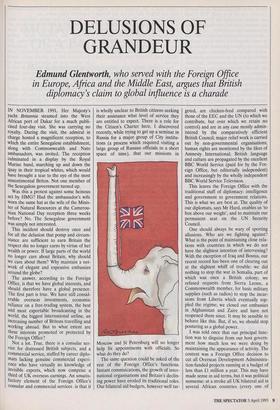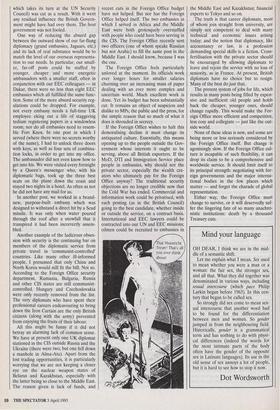DELUSIONS OF GRANDEUR
Edmund Glentworth, who served with the Foreign Office
in Europe, Africa and the Middle East, argues that British diplomacy's claim to global influence is a charade
IN NOVEMBER 1991, Her Majesty's yacht Britannia steamed into the West African port of Dakar for a much publi- cised four-day visit. She was carrying no royalty. During the visit, the admiral in charge hosted a magnificent reception, to which the entire Senegalese establishment, along with Commonwealth and Nato ambassadors, was invited. The reception culminated in a display by the Royal Marine band, marching up and down the quay in their tropical whites, which would have brought a tear to the eye of the most unsentimental Briton. Not one member of the Senegalese government turned up.
Was this a protest against some heinous act by HMG? Had the ambassador's wife worn the same hat as the wife of the Minis- ter of Natural Resources at the Camerou- nian National Day reception three weeks before? No. The Senegalese government was simply not interested.
This incident should destroy once and for all the delusion that pomp and circum- stance are sufficient to earn Britain the respect she no longer earns by virtue of her wealth or power. If large parts of the world no longer care about Britain, why should we care about them? Why maintain a net- work of elegant and expensive embassies around the globe?
The answer, according to the Foreign Office, is that we have global interests, and should therefore have a global presence. The first part is true. We have still consid- erable overseas investments, economic reliance on a free-trading system, the best and most exportable broadcasting in the world, the biggest international airline, an increasing number of Britons travelling and working abroad. But to what extent are these interests promoted or protected by the Foreign Office?
Not a lot. True, there is a consular ser- vice for distressed British subjects, and a commercial service, staffed by career diplo- mats lacking genuine commercial experi- ence who have virtually no knowledge of invisible exports, which now comprise a third of UK overseas earnings. An unsatis- factory element of the Foreign Office's consular and commercial services is that it Is wholly unclear to British citizens seeking their assistance what level of service they are entitled to expect. There is a role for the Citizen's Charter here. I discovered recently, while trying to get up a seminar in Russia for a major group of City institu- tions (a process which required visiting a large group of Russian officials in a short space of time), that our missions in Moscow and St Petersburg will no longer help fix appointments with officials. So what do they do?
The same question could be asked of the rest of the Foreign Office's functions. Instant commuications, the growth of inter- national organisations and Britain's declin- ing power have eroded its traditional roles. Our bilateral aid budgets, however well tar- geted, are chicken-feed compared with those of the EEC and the UN (to which we contribute, but over which we retain no control) and are in any case mostly admin- istered by the comparatively efficient British Council; major relief work is carried out by non-governmental organisations; human rights are monitored by the likes of Amnesty International; British language and culture are propagated by the excellent BBC World Service (paid for by the For- eign Office, but editorially independent) and increasingly by the wholly independent BBC World Service Television.
This leaves the Foreign Office with the traditional stuff of diplomacy: intelligence and government to government relations. This is what we are best at. The quality of our diplomats, says Mr Hurd, enables us 'to box above our weight', and to maintain our permanent seat on the UN Security Council.
One should always be wary of sporting allusions. Who are we fighting against? What is the point of maintaining close rela- tions with countries in which we do not have the slightest intention of intervening? With the exception of Iraq and Bosnia, our recent record has been one of clearing out at the slightest whiff of trouble: we did nothing to stop the war in Somalia, part of which was once a British colony; we refused requests from Sierra Leone, a Commonwealth member, for basic military supplies (such as radios) to stop the incur- sions from Liberia which eventually top- pled the regime; we closed our embassies in Afghanistan and Zaire and have not reopened them since. It may be sensible to behave like this. But, if so, we should stop posturing as a global power.
I was told once that our principal func- tion was to disguise from our host govern- ment how much less we were doing by maintaining the appearance of activity. The context was a Foreign Office decision to cut all Overseas Development Administra- tion-funded projects running at a budget of less than £1 million a year. This may have made sense in aid terms, but it was political nonsense: at a stroke all UK bilateral aid in several African countries (every one of which takes its turn at the UN Security Council) was cut as a result. With it went any residual influence the British Govern- ment might have had over them. The host government was not fooled.
One way of reducing the absurd gap between the outward show of our far-flung diplomacy (grand embassies, Jaguars, etc.) and its lack of real substance would be to match the level of our overseas representa- tion to our needs. In particular, our small- er, far-off posts could be staffed by younger, cheaper and more energetic ambassadors with a smaller staff, often in conjunction with our EEC colleagues — in Dakar, there were no less than eight EEC embassies which all fulfilled the same func- tion. Some of the more absurd security reg- ulations could be dropped. For example, not every embassy needs a full-time UK employee eking out a life of staggering tedium registering papers in a windowless room; nor do all embassies need to resem- ble Fort Knox. In one post in which I served (where there were no secrets worthy of the name), I had to unlock three doors with keys, as well as four sets of combina- tion locks, in order to get into my office. The ambassador did not even know how to get into his. We were visited every fortnight by a Queen's messenger who, with his diplomatic bags, took up the three best seats on the plane down the coast and stayed two nights in a hotel. As often as not he did not have any mail for us.
In another post, we worked in a brand- new, purpose-built embassy which was designed to withstand a direct hit by a Scud missile. It was only when water poured through the roof after a snowfall that it transpired it had been incorrectly assem- bled.
Another example of the ludicrous obses- sion with security is the continuing bar on members of the diplomatic service from private travel in 'communist-controlled' countries. Like many other ill-informed people, I presumed that only China and North Korea would still fit the bill. Not so. According to the Foreign Office security department, Rumania, Bulgaria, Russia and other CIS states are still communist- controlled. Hungary and Czechoslovakia were only recently removed from the list. The very diplomats who have spent their professional careers endeavouring to bring down the Iron Curtain are the only British citizens (along with the army) prevented from enjoying the fruits of their labour.
All this might be funny if it did not betray an alarming lack of common sense. We have at present only one UK diplomat stationed in the CIS outside Russia and the Ukraine (there were two, but one fell down a manhole in Alma-Ata). Apart from the lost trading opportunities, it is particularly worrying that we are not keeping a closer eye on the nuclear weapon states of Belarus and Kazakhstan, especially with the latter being so close to the Middle East. The reason given is lack of funds, and recent cuts in the Foreign Office budget have not helped. But nor has the Foreign Office helped itself. The two embassies in which I served in Africa and the Middle East were both grotesquely overstaffed with people who could have been serving in the CIS. The Foreign Office recently sent two officers (one of whom speaks Russian but not Arabic) to fill the same post in the Middle East. I should know, because I was the one.
The Foreign Office feels particularly unloved at the moment. Its officials work ever longer hours for smaller salaries churning over an increasing mass of paper dealing with an ever more complex and uncertain world. Much excellent work is done. Yet its budget has been substantially cut. It remains an object of suspicion and dislike to MPs, the public and the press, for the simple reason that so much of what it does is shrouded in secrecy.
If the Foreign Office wishes to halt this demoralising decline it must change its antiquated culture. Essentially, this means opening up to the people outside the Gov- ernment whose interests it ought to be serving, above all British exporters. If the MoD, DTI and Immigration Service place people in embassies, why should not the private sector, especially the wealth cre- ators who ultimately pay for the Foreign Office anyway? The traditional security objections are no longer credible now that the Cold War has ended. Commercial and information work could be privatised, with each posting (as in the British Council) going to the best candidate, whether inside or outside the service, on a contract basis. International and EEC lawyers could be contracted into our UN and EEC missions; oilmen could be recruited to embassies in the Middle East and Kazakhstan; financial experts to Tokyo and so on.
The truth is that career diplomats, most of whom join straight from university, are simply not competent to deal with many technical and economic issues arising today; and the notion that diplomacy, like accountancy or law, is a profession demanding special skills is a fiction. Cross- fertilisation with the private sector should be encouraged by allowing diplomats to leave and rejoin the service with no loss of seniority, as in France. At present, British diplomats have no choice but to resign. Many of the best do just that.
The present system of jobs for life, which results in many posts being filled by expen- sive and inefficient old people and holds back the cheaper, younger ones, should change rapidly. This would make the For- eign Office more efficient and competitive, less cosy and collegiate — just like the out- side world.
None of these ideas is new, and some are being more or less seriously considered by the Foreign Office itself. But change is agonisingly slow. If the Foreign Office cul- ture is incapable of such flexibility, it can drop its claim to be a comprehensive and worldwide service. It should limit itself to its principal strength: negotiating with for- eign governments and the major interna- tional bodies in the few places which matter — and forget the charade of global representation.
Either way, the Foreign Office must change to survive, or it will deservedly suf- fer the lingering fate of so many anachro- nistic institutions: death by a thousand Treasury cuts.



















































 Previous page
Previous page